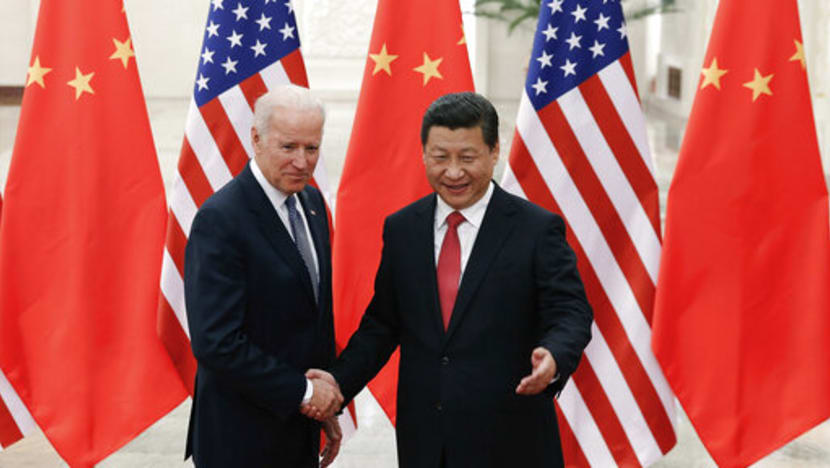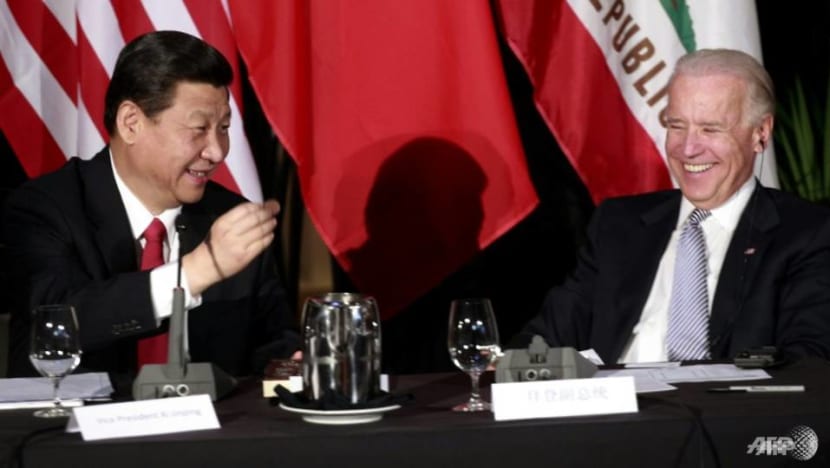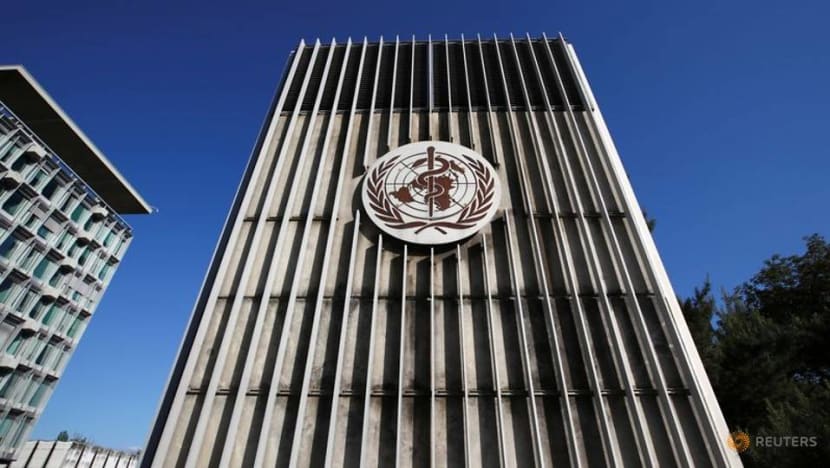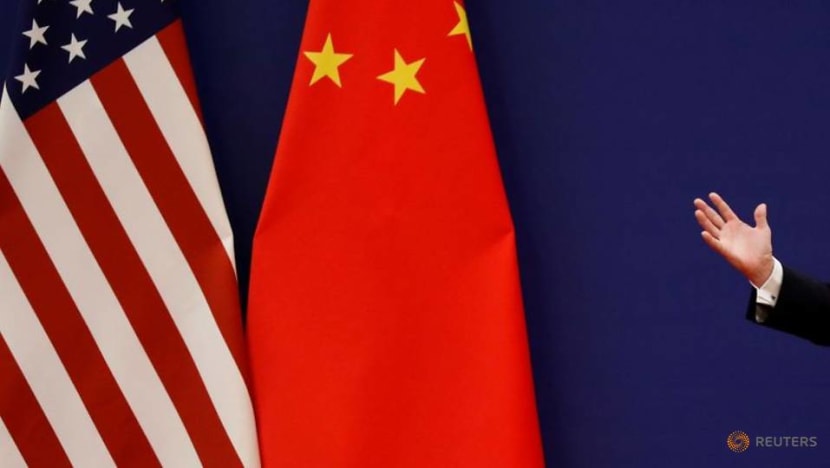commentary Commentary
Commentary: It’s engagement not containment of China that Joe Biden will focus on
Stabilising US-China relations must be a chief priority for the incoming commander-in-chief, says Ted Gover.

Then United States vice president Joe Biden and Chinese President Xi Jinping in Beijing on Dec 4, 2013. (File photo: AP)
CLAREMONT, California: Concern has been expressed in recent weeks that the incoming Joe Biden administration will be pressured to take a tough stand against China given the bipartisan, national consensus that China has become a US adversary.
This competitive dynamic between both countries has roots in concerns over maritime disputes, human rights, political ideology and trade practices, but has also included other dimensions – military rivalry, as well as concerns over the Belt and Road and 5G technologies.
While US President Donald Trump has highlighted many of these concerns in his administration, some of these points of contention are decades in the making and are not new.
LISTEN: US election: A bitter fight for the soul of the world's most powerful nation
READ: Commentary: We may be in the early stages of a new Cold War
States around the globe – Asia-Pacific nations in particular - fear this will feed an unhealthy, zero-sum competition in which they will be forced to choose between Washington and Beijing.
Many world leaders are left wondering, can President-elect Biden stabilise US-China relations going forward as their rivalry intensifies?
Will the US move away from engagement and cooperation and towards greater competition, possibly even containment?
READ: Commentary: After a stormy few years, verdict on Trump’s trade war with China is clear
READ: Commentary: How Tencent became world’s most valuable social media company – and then everything changed
DEMONSTRATE WILLINGNESS TO WORK TOGETHER
While some facets of the Biden administration’s China policy will be firm – such as security and technology issues – my assessment is that the new White House’s overall tone towards China will improve.
Biden understands the importance of the US-China relationship and has framed it in positive terms. "If we get this relationship right with a genuine new model, the possibilities are limitless," he has once said.
If so, we are likely to see efforts made towards encouraging partnerships with Beijing, building mutual respect and resuming high-level communications between both countries and their leaders.

For example, both leaders are likely to reach out to one another to establish the parameters of the new US-China relationship. The two have shared a good personal relationship in the past.
During the Barack Obama administration, Xi referred to Biden as “an old friend of China”.
Solidifying the relationship at that leadership level will allow both sides to communicate frankly their red lines and lay out areas of possible collaboration as well as spheres of strategic competition.
READ: Commentary: A US led by Joe Biden will focus on Asia and China
Biden may also endeavour to resurrect the yearly US-China Strategic and Economic Dialogues started by the Bush and Obama administrations to address shared challenges as well as areas of disagreement.
A small but important way to build further trust is to reopen American society to Chinese students, scholars and businesses. Reembracing those from China who seek to study, work and immigrate to the US will be an important step towards fostering cordial, respectful relations.
Taking into account China’s concern over Taiwan can be another important step. Biden can communicate that he will observe China’s core interests on Taiwan by placing select quotas on US arms sales to Taipei, ceasing with high-profile visits by administration officials and limiting US transit visas to Taiwanese government leaders visiting the Americas.
READ: Commentary: US-China rivalry will see a long and bumpy journey
ENGAGE CHINA ON AREAS OF MUTUAL INTEREST MULTILATERALLY
Involving partners in international efforts to combat global ills has been Biden’s repeated objective while on the US presidential election campaign trail, which could reap benefits in providing platforms for the US to additionally engage China.
An early expected move by the Biden administration will be rejoining the World Health Organization and finding ways to work with Xi on fighting COVID-19 and other global health measures.

Another area in which Biden and Xi can pledge cooperation is climate change. Both leaders realise that their countries’ joint efforts are necessary in order to make headway on this global issue.
As part of this, one of Biden’s first actions as President will be to rejoin the Paris climate agreement, an act that will generate domestic criticism as some in the US view the accord as a flawed deal.
LISTEN: Just how will a Biden presidency move US and global action on climate change? | EP 13
Although controversial in the US, we also already know that Biden’s team will seek to work with China (along with other permanent members of the UN Security Council, Germany and the EU) on entering into a new treaty with Iran to contain its nuclear programme.
Within the Asia-Pacific, engaging China through the ASEAN-led multilateral networks could socialise the country to norms of international behaviour, particularly regarding disputes in the South China Sea.
READ: Commentary: The RCEP will change the economics and politics of the region
NUANCING “THE QUAD”
Efforts must be renewed to avert a direct collision between Washington and Beijing. To this end, Biden must seek to reduce the openly anti-China signaling of “the Quad”, the Australia-Japan-India-US partnership geared towards supporting a free and open Indo-Pacific.
While this four-country collaboration has its important objectives and should be enhanced in the coming years, it need not be publicly antagonistic nor create a public loss of face for Beijing.
Canberra, Tokyo, New Delhi and Washington must do more to maintain cordiality and identify areas of cooperation with Beijing.
Overall, policymakers in China can take heart in Biden's commitment to finding ways of partnering with Beijing on common areas of concern like climate change, COVID-19 measures and public health, global financial risk, nonproliferation, academic exchanges and Iran’s burgeoning nuclear programme.

It bears saying it’s no secret the incoming Biden administration’s focus on human rights is worrying for China, who interpret these words as license for what they see as foreign activism and interference into sensitive domestic affairs, including on Hong Kong and the treatment of Uighur Muslims and Christians in China.
This strongly held difference in values between Washington and Beijing is clearly an issue that both sides will undoubtedly struggle with in the coming years.
However, while human rights are an important pillar of Biden’s beliefs, he is not likely to let the issue upset the entirety of the relationship.
READ: Commentary: Biden needs to build bridges, literally, in the US
BUT CHINA MUST ALSO PLAY BALL
But China too must want a productive relationship and avoid taking aggressive action that will produce further backlash in Washington. In a quid-pro-quo relationship, China must take actions to demonstrate goodwill in exchange for concessions that Biden might make.
For his part, Xi can dial back China’s bellicose conduct in the Himalayas, the East and South China Seas and decrease its aggressive military drills near Taiwan.
Beijing can also convey to Washington its desire to work with the new Biden administration on ways to address the North Korean nuclear crisis.
READ: Commentary: This country holds the key to unlocking the North Korea problem
POTENTIAL FOR A NEW US-CHINA RELATIONSHIP
Clearly, there are many areas of distrust and disagreement between Washington and Beijing spanning maritime disputes, contending political models, tariffs and trade, technology transfer and intellectual property.
Yet, in an era of intensifying competition, Biden’s assumption of power in January 2021 carries the potential of turning over a new leaf in US-China ties and establishing a mutual understanding of core interests that stabilises the relationship.
These efforts would go a long way towards rebuilding respect between both countries and laying the groundwork for a positive and peaceful collective future for the Asia-Pacific.
Ted Gover writes on foreign policy and is Director of the Tribal Administration Program at Claremont Graduate University.












